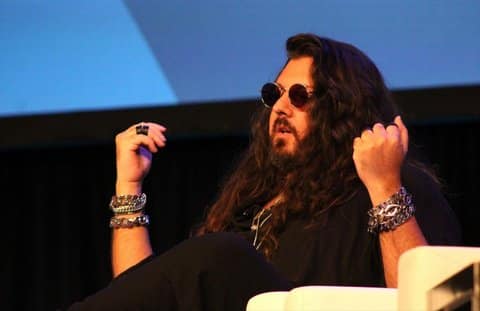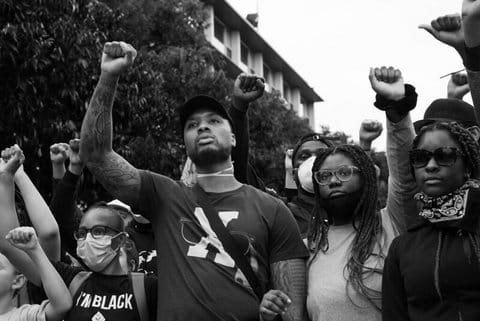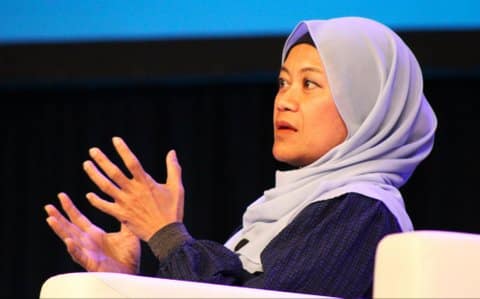
12 Mar Hate Speech and Extremism Recruitment Rising in Video Games but Maybe Not For Long

Video game designer Luc Bernard, seen at the Eradicate Hate Global Summit, is enabling thousands of online players to get a free Holocaust museum ticket — in the digital world of Fortnite. (Joe Porrello / CC Pulse)
Editor’s note: The Eradicate Hate Global Summit began in 2021 in response to the mass shooting at the Tree of Life synagogue. Last year, The CC Pulse was there for the first time in service of our Stop the Hate coverage. This is one of many stories we will publish that is about or inspired by the summit.
By Joe Porrello
PITTSBURGH — The video game sphere is ripe with toxicity, but different sectors are working together to curtail hate within commercial gaming platforms.
A panel at the Eradicate Hate Global Summit including academics, artists and self-proclaimed gamers considered the pitfalls of video games — hate and extremism in online games recently increased for a fourth consecutive year — but said they can be a beacon for positive change.
The problem is nothing new, but some of the research and proposed solutions are.
Luc Bernard designs video games that educate players about the Holocaust. He said now is a particularly crucial time to analyze video games because, in his view, they have surpassed TV, film and music as the leading entertainment outlet.
“We’re the shapers of culture,” he said. “We really are.”
With relatively little research available previously, video game studies are now rampant.
The Anti-Defamation League found in 2021 that an estimated 2.3 million teens were exposed to white-supremacist ideology in multiplayer games and about two-thirds of the estimated 25 million U.S. gamers aged 10 to 17 experienced harassment on multiplayer platforms.
Jacob Davey combats hate in video games as head of research and policy at the Institute for Strategic Dialogue, an independent, nonprofit organization aiming to safeguard human rights and lessen disinformation worldwide.
Davey works on Gamers Who Hate, looking at extremist mobilization and activity on gaming-adjacent platforms, such as Twitch.
According to the International Centre for Counter-Terrorism, extremists use video games and gaming platforms to plan attacks and post manifestos, or draw inspiration from video game aesthetics while conducting attacks.
Additionally, as Davey said, some attacks, such as the 2022 grocery store shooting in Buffalo, N.Y., are livestreamed on Twitch.
Davey said video games being a breeding ground for hate is a legitimate concern as extremists take advantage of the bias and prejudice that are normalized in online play. But, he said, it’s “an important notion to push back on that gaming is in some way an inherent room for radicalization.”
Moderator Daveed Gartenstein-Ross, founder and CEO of Valens Global — which designs and runs wargames that give participants the opportunity to explore real-world dilemmas — seconded Davey’s notion.
“When we look at the range of tools we have that technology brings to us, obviously for each one that’s amazing and makes our lives better, there are going to be bad people out there who think about how to use them to do bad things,” he said. “Games are no different in that regard.”
According to the ICCT, reports indicate that extremists use gaming platforms to recruit and groom vulnerable individuals.
>>>Q&A: How Youth Become Radicalized and What to Do
Rachel Kowert, research director at Take This — a mental health advocacy organization with a focus on the game industry and community — said video games form friendships backwards by establishing trust before getting to know someone, a factor exploited by hate groups in recruitment.
Kowert said a recent Take This study found 80% of users feel hate in games is normalized, while 75% experienced in-game hate.
“I am not saying games are the cause of these problems, but rather, they are reinforcing predilections,” she said.
Research shows youth who experience or witness toxic behavior in gaming platforms suffer adverse mental and emotional health effects, according to USA Today.
Being subject to racism in a space that many turn to for leisure could play a role in a rise in suicidality rates among young Black people, USA Today also reported.
>>>Read: Games Are Good, but Not as Nice as the Real World
Half the world population plays video games, so Kowert said strategies to combat hate within them shouldn’t be one-size-fits-all.
As director of “The Light and The Darkness” — the first video game specifically about the Holocaust — Bernard is ahead of the curve. He self-financed the game and released it for free; over 350,000 players have completed it.
“Video games can be used for good; they can actually make society more empathetic,” a factor he said is not focused on enough.
Bernard also released the first in-game Holocaust museum — “Voices of the Forgotten” — within “Fortnite.”
He pointed to countless WWII games not accurately representing the Holocaust, mentioning many young people who inadvertently get some of their world history from video games.
“There are 6 million stories that need to be told,” Bernard said, referring to the number of Jewish people killed by Nazis. “We need to humanize the victims.”
In “Voices,” real photos of victims are shown, at which point Bernard said people usually break down in tears.
By omitting parts of history in video games and either showing Nazis killing people or having characters control them to do so, Bernard believes it glorifies and standardizes violent extremism.
“There is a reason these young people think Nazis are cool,” he said.
Bernard said he hopes his designs open the door for more educational games with a focus on historical traumatic experiences.
Mike Pappas, founder of Modulate — an A.I. startup helping game studios limit toxicity and protect players — said a large hurdle in curtailing hate in video games is that moderation in real-time is costly, time-consuming, and can’t be delayed to be vetted without ruining the experience.
>>>Read: As Tech Turns to A.I. to Fight Hate, Experts Warn Human Input Is Critical
“Let’s be real: This is a hard problem that the studios are faced with,” Pappas told the Pulse.
Another problem is in-game conduct codes.
Players cited for violating codes of conduct look to be reinstated even after egregious offenses, with confidence they did nothing wrong in many instances, Pappas said. He puts the onus on studios to elaborate their rules.
Pappas said an EA Sports study on the game “Apex Legends” showed that explaining to a user how they broke the code, instead of just kicking them off, dropped repeated offenses by 85%.
Hate and extremism are also hurting the revenue streams of gaming studios, Pappas told the Pulse. Players don’t want to be inundated with slurs every time they log on.
In addition, Pappas said video games can sometimes lead to an “us vs. them” mindset, and anonymity can make it easier to both dehumanize others and avoid consequences.
Kowert said change needs to come from within gaming culture.
“Top-down intervention certainly has its place and is important — moderation, game design, policy — but bottom-up culture change is where we’re going to have more diffused, long-lasting effects,” said Kowert.
The things that keep us engaged in games like world-building, characters and narrative arcs are instrumental in spreading positivity, said Gartenstein-Ross.
Bernard agreed: “Stories are the most powerful thing in the world, pretty much.”
Pappas said video games can have positive mental health effects, citing a study by The Trevor Project on LGBTQ+ youth that found general mental health declined among subjects during the pandemic — except among a sub-cohort that had access to games where one could create their own character.
Although frequently toxic, Pappas believes video games are still powerful in bringing people together, and that A.I. will be particularly beneficial battling bigotry in the video game sphere because of its ability to catch hateful content before humans can. Though, he said in another summit panel that humans need to be a part of the process, warning platforms not to rely on A.I. alone.
“The game industry is trying to solve this problem,” he said. “It’s really just a genuinely difficult issue to solve.”
This resource is supported in whole or in part by funding provided by the State of California, administered by the California State Library in partnership with the California Department of Social Services and the California Commission on Asian and Pacific Islander American Affairs as part of the Stop the Hate program. To report a hate incident or hate crime and get support, go to CA vs Hate.





No Comments